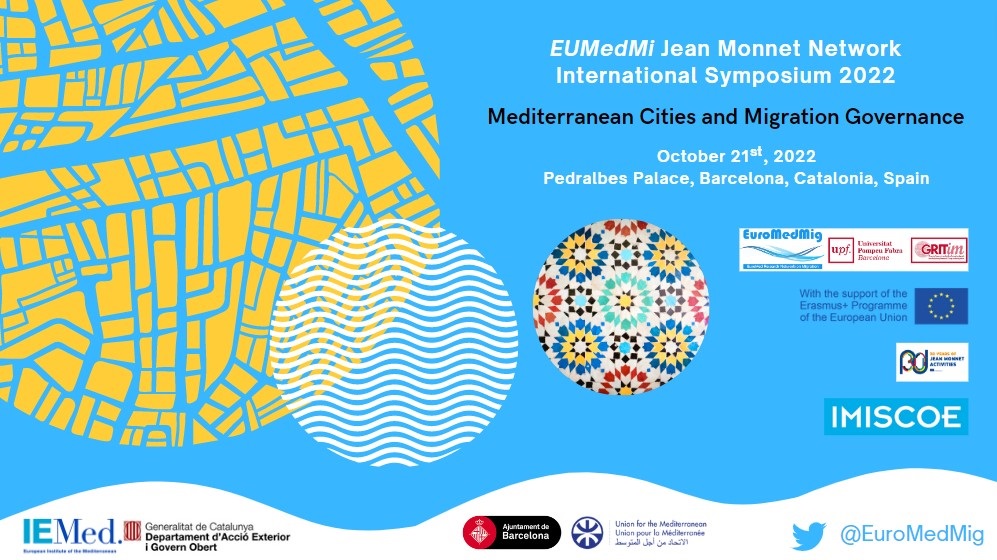The role of Mediterranean cities in migration governance, the main thread of a symposium organized by GRITIM-UPF at Pedralbes Palace
The role of Mediterranean cities in migration governance, the main thread of a symposium organized by GRITIM-UPF at Pedralbes Palace
The role of Mediterranean cities in migration governance, the main thread of a symposium organized by GRITIM-UPF at Pedralbes Palace
This is the final activity of the European project “Mapping Mediterranean and European migration studies” (EUMedMi), which involves seven member countries of the EuroMedMig network, and will be held on 21 October. The Symposium, which will be attended by the Catalan minister Meritxell Serret i Aleu, aims to establish a new political and research paradigm in the field of migration governance, based on a local perspective, and incorporate it into the Euro-Mediterranean agenda.

The Interdisciplinary Research Group on Immigration (GRITIM-UPF) has organized the international symposium titled “Mediterranean Cities and Migration Governance”, which is to take place on Friday 21 October at Pedralbes Palace in Barcelona.
This multilateral meeting aims to offer a space for dialogue between the social, political and academic fields with a common purpose: to promote the diversity of Mediterranean voices to understand how cities can be the focus of research and political debate on migration in this region.
Ricard Zapata-Barrero: ”The symposium is an opportunity to gather multiple voices in the governance of Mediterranean migration, sharing the value of re-scaling knowledge production from the state to the city perspective .”
The symposium is the final activity of the European project EuMedMi ”Mapping Mediterranean and European Migration Studies” (September 2019 - August 2022), coordinated by GRITIM-UPF, and funded by the European Erasmus programme and the Jean Monnet Network. EuMedMi is a platform involving seven partner centres from countries in the region (Spain, Portugal, Morocco, Tunisia, Turkey, France and Belgium), all members of the Steering Committee of the Euro-Mediterranean Research Network on Migration (EuroMedMig), dedicated to research into an agenda for Mediterranean migration.
The symposium will opened on 21 October at 9 am by Ricard Zapata-Barrero (UPF and EuroMedMig), Pau Solanilla Franco (Commissioner for City Promotion. Barcelona City Council), Senén Florensa (IEMed president), and the Catalan minister of Foreign Affairs and European Union, Meritxell Serret i Aleu (one of her first commitments in her new post). The session will be chaired by Ibrahim Awad, co-coordinator of EuroMedMig, and professor at the American University in Cairo, Egypt.
According to Ricard Zapata-Barrero, full professor at the UPF Department of Political and Social Sciences, director of EuroMedMig and of the GRITIM-UPF research group and member of the organizing committee, “The symposium is an opportunity to gather multiple voices in the governance of Mediterranean migration, sharing the value of re-scaling knowledge production from the state to the city perspective. It aims to explore three key points: an academic research agenda, a platform for policy development, and active decision-making.”
A commitment to migration and the cities of the Mediterranean
The cities of the Mediterranean have developed over the centuries thanks to the influence of the various peoples and cultures that have come to them through trade and colonialism. Today, globalization, political instability and growing socioeconomic disparities between countries have revitalized and increased human mobility. As a result, migration and refugees have been put at the centre of local political agendas. Current human movements add a new layer to previous urban migratory heritage, also leading the cities of the Mediterranean to be considered potential new players in Euro-Mediterranean dialogues.
What questions will be discussed during the symposium and what is its goal?
The symposium program will consist of a series of round table debates, designed by a delegation from each partner country, including representatives of local government, civil society actors and academics, as well as members of countries that belong to the EuroMedMig network as associate partners, such as Lebanon, Egypt, Greece and Italy.
The main issues that will be addressed at the event are as follows:
- What are the main migratory challenges and opportunities in the cities of the Mediterranean today?
- How can the perspective of cities be incorporated into the current Euro-Mediterranean migration agenda?
- What can Mediterranean cities learn from the past and what will they be like in the future?
- What is the state of the art of knowledge production and data limitations on Mediterranean migration cities?
Other issues that will be addressed are how Mediterranean cities manage the reception of and provide assistance to migrants and refugees; how urbanization processes, demographic change and economic dynamics shape socio-spatial inequalities and integration in Mediterranean cities; how the role of civil society organizations has evolved in addressing migration problems in the region of Mediterranean cities, and the future of humanitarian action in this field.
In addition to targeting scholars and researchers, the symposium seeks to yield recommendations for local governments and urban policy makers on multiple aspects and sectors related to the process of migration governance in the Mediterranean region. It also aims to reach international organizations involved in Euro-Mediterranean policies.
The Euro-Mediterranean Research Network on Migration (EuroMedMig), which was launched in 2018 at Pompeu Fabra University, is an initiative supported by IMISCOE and Union for the Mediterranean. The symposium is also supported by the Government of Catalonia (Department of Foreign Affairs and European Union), Barcelona City Council and the European Institute of the Mediterranean (IEMed).
